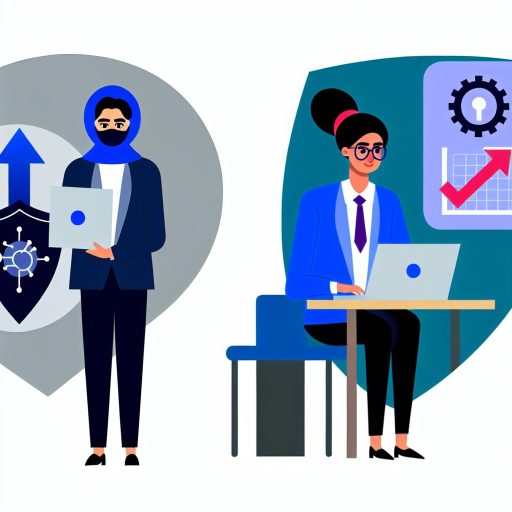Overview of the Current Software Development Job Market in New Zealand
Demand for Software Development Professionals
New Zealand experiences a growing demand for skilled software developers.
Many companies actively seek professionals with expertise in diverse programming languages.
Moreover, sectors like fintech, health tech, and agriculture technology drive this demand.
For example, companies such as Orion Health and Xero regularly expand their development teams.
In addition, startups in Auckland and Wellington contribute to increasing job openings.
Job Market Trends and Salary Expectations
Software development jobs in New Zealand offer competitive salaries compared to other industries.
Senior developers often earn significantly higher wages reflecting their experience level.
Furthermore, flexible working arrangements, including remote work, have become common.
Consequently, this flexibility attracts talented professionals around the country.
Recruitment firms like Talent International report rising salary benchmarks each year.
Skills and Technologies in Demand
Employers increasingly value skills in cloud computing and DevOps practices.
Additionally, proficiency in JavaScript frameworks such as React and Angular stands out.
Experience with artificial intelligence and machine learning also attracts strong interest.
Data engineering abilities gain importance alongside traditional software development skills.
Consequently, professionals who continuously upskill maintain a competitive edge in the job market.
Personalized Career Consulting
Unlock your potential with expert career advice tailored to your goals. Get personalized guidance and actionable steps toward your dream career in New Zealand.
Get StartedEmployment Landscape and Company Profiles
New Zealand hosts a blend of large corporations and agile startups hiring software developers.
Companies like Fisher & Paykel Healthcare emphasize innovation and software-driven solutions.
Conversely, younger firms such as Halter and Crimson Education rely heavily on cutting-edge technology.
This diversity creates varied job opportunities tailored to different skill sets.
Therefore, developers can find roles that match their career ambitions and expertise.
Introduction to AI Technologies Influencing Software Development
Emergence of AI in Software Development
Artificial intelligence has rapidly become a vital tool in software development.
Leading New Zealand companies like KiwiSoft Solutions use AI to enhance coding efficiency.
AI technologies reduce repetitive tasks and accelerate project timelines.
Consequently, developers spend more time on creative problem-solving.
Moreover, AI supports better software quality through automated testing.
Key AI Technologies Transforming Development Practices
Machine learning algorithms help predict bugs before software releases.
Natural language processing enables AI-assisted code generation and debugging.
For instance, companies such as Wellington-based CodeCrafters integrate AI chatbots for developer support.
Additionally, AI tools analyze large codebases to suggest improvements.
Transform Your Career with a Professional CV and Cover Letter
Stand out to employers with an ATS-optimized resume and tailored cover letter designed to match your dream role. Let us craft your job application materials for success!
Get StartedSuch technologies improve collaboration among distributed development teams.
Impact on Developer Roles and Skills
AI tools increasingly shift the focus of developers towards higher-level tasks.
Developers at Auckland Tech Innovations embrace AI to automate routine programming work.
Therefore, skills in AI-assisted development platforms become highly sought after.
Furthermore, continuous learning is essential to keep pace with evolving AI technologies.
Ultimately, AI enhances developer productivity without replacing human creativity.
How AI is Automating Routine Coding and Testing Tasks
Automation in Coding Tasks
Artificial intelligence is rapidly transforming software development processes in New Zealand.
Developers at KiwiTech Solutions utilize AI tools to automate repetitive coding tasks.
Consequently, these tools generate boilerplate code faster than manual programming.
Moreover, AI-driven code completion assists programmers by suggesting context-aware snippets.
For example, Emma Johnson, a software engineer in Wellington, reports improved productivity using AI assistants.
Such tools free developers to focus on complex and creative problem-solving aspects.
AI Enhancements in Testing Procedures
Software testing also benefits significantly from AI automation.
Bayhaven Software employs AI to create and execute test cases automatically.
Boost Your Career with a Standout LinkedIn Profile
Attract recruiters and expand your network with a fully optimized LinkedIn profile tailored to highlight your strengths and professional goals. Let your profile open doors to new opportunities!
Get OptimizedFurthermore, AI detects patterns in bugs that humans might overlook.
This enhancement accelerates the debugging process and improves product quality.
Testers like Michael Chen highlight that AI reduces manual test effort remarkably.
It also helps prioritize tests based on historical defect data and usage metrics.
Benefits of Automating Routine Tasks with AI
Automating routine coding and testing saves time consistently in development cycles.
Additionally, it reduces human error in repetitive and mundane tasks.
Software companies such as Apex Logic see faster release schedules with AI implementation.
Besides efficiency, developers experience less burnout and more job satisfaction.
Therefore, AI supports New Zealand’s software industry in staying competitive globally.
Challenges and Adaptation
Despite advantages, some developers face a learning curve with new AI tools.
Organizations invest in training programs to ease this transition effectively.
As a result, engineers like Tessa Morgan adapt skills toward AI-enabled workflows.
This adaptation ensures they maintain relevance in an evolving job market.
Hence, continuous learning remains crucial alongside AI deployment in software development.
Uncover the Details: The Rise of Cloud Computing Careers in New Zealand
The Impact of AI on Demand for Software Development Skills and Roles
Shifts in Skill Requirements
Artificial intelligence transforms the skill set software developers need in New Zealand.
Companies increasingly seek professionals with AI integration expertise.
Moreover, proficiency in machine learning frameworks grows more essential.
Backend developers now require knowledge of AI-driven automation tools.
Consequently, continuous learning becomes vital to stay relevant in the field.
Developers also need strong data literacy for effective AI collaboration.
Emerging and Evolving Roles
AI creates new roles while reshaping traditional software development jobs.
Positions like AI application developer and machine learning engineer gain prominence.
Additionally, AI ethicists and data annotators have emerged in the workforce.
Meanwhile, routine coding tasks gradually automate, shifting focus to creative problem-solving.
Companies such as Phoenix Interactive prioritize hiring hybrid AI-software experts.
Therefore, adaptability in job roles becomes crucial.
Industry Demand Trends in New Zealand
Local tech firms experience rising demand for AI-integrated software solutions.
Investments in AI-driven products stimulate growth in development roles.
For instance, KiwiSoft Solutions revamped its team to include AI specialists.
Startups emphasize AI competency to innovate in competitive markets.
Consequently, recruitment agencies report increased openings for AI-savvy developers.
These trends indicate a strong shift towards AI-focused skill requirements nationwide.
Implications for Career Pathways and Training
AI influences career progression and educational pathways in software development.
Universities like Auckland Tech Institute now offer AI-centric curricula.
Training programs emphasize practical AI applications alongside classical coding.
Moreover, certification in AI tools enhances employability prospects.
Experienced developers often reskill to integrate AI competencies successfully.
Thus, lifelong learning becomes a cornerstone of career development.
Find Out More: How Artificial Intelligence Is Changing IT Careers in NZ
Opportunities Created by AI for New Software Development Specializations
Expansion of AI-Focused Roles
AI technology drives demand for new software development roles in New Zealand.
Specialists in machine learning and natural language processing are increasingly sought after.
Companies like KiwiTech Innovations actively recruit AI engineers and data scientists.
AI ethics and explainability have become crucial specializations in the software sector.
This shift encourages developers to acquire skills beyond traditional coding.
Growth in Automation and DevOps Engineering
Automation tools powered by AI require skilled engineers to implement and maintain them.
DevOps professionals with AI expertise are becoming essential for efficient workflows.
Innovative firms such as Rotorua Digital Solutions invest heavily in AI-driven automation.
These engineers design pipelines that integrate AI components seamlessly into software systems.
New career paths in AI-centric DevOps emerge across New Zealand’s tech landscape.
Specializations in AI-Enhanced User Experience Design
AI is transforming how users interact with software applications.
Designers now specialize in creating AI-driven user interfaces and personalized experiences.
Companies including Wellington Interactive Labs pioneer projects in AI-powered UX design.
Experts in this field combine software development with cognitive psychology insights.
AI opens avenues for hybrid roles blending technical and creative skills.
Opportunities in AI Security and Privacy Engineering
AI introduces new security challenges requiring dedicated software specialists.
Privacy engineers focus on protecting user data in AI-enabled software.
Businesses like Auckland Cyber Defense employ teams specialized in AI security measures.
Developers working in this specialization design systems resilient to AI-related threats.
AI increases the demand for professionals focused on safe and ethical software.
Emergence of AI Integration and API Development
Integrating AI capabilities into existing software creates roles for API developers.
Developers craft interfaces that allow smooth interaction with AI services.
Christchurch-based firm Synapse Solutions hires experts in AI API integration.
This specialization requires deep understanding of both AI models and software architecture.
AI fosters new technical niches centered on interoperability and extensibility.
Key Skills Driving New Specializations
- Proficiency in AI frameworks like TensorFlow and PyTorch.
- Expertise in data engineering and feature engineering techniques.
- Understanding of cloud platforms and AI model deployment.
- Knowledge of ethical AI practices and regulatory compliance.
- Ability to collaborate across interdisciplinary teams.
Developers seeking future-proof careers should embrace continuous learning in these areas.
Gain More Insights: NZ’s Cybersecurity Job Boom: What Skills Are in High Demand?
Challenges Faced by Software Developers Adapting to AI Integration
Shifting Skill Requirements
Software developers in New Zealand must quickly learn new AI-related skills.
This shift demands proficiency in machine learning, data analysis, and AI frameworks.
Consequently, many experienced developers find their current skills insufficient.
Programmers like Ethan Blake from Auckland have reported steep learning curves.
Moreover, continuous education becomes essential to keep pace with evolving technologies.
Changes in Development Processes
AI integration alters traditional software development workflows significantly.
Teams now must collaborate closely with data scientists and AI specialists.
Therefore, DevOps pipelines also need adjustments to handle AI model deployment.
Developers at companies such as TechSphere face challenges integrating AI testing and validation routines.
As a result, project timelines can become unpredictable during the adaptation period.
Job Security Concerns
Many developers worry AI automation might replace some routine coding tasks.
This uncertainty leads to increased stress and resistance to AI adoption.
For instance, senior engineer Liam Matthews expressed concerns over job displacement.
However, others view AI as an opportunity to focus on higher-value design tasks.
Balancing these perspectives poses a significant emotional challenge.
Organizational and Cultural Barriers
Some New Zealand tech firms exhibit reluctance to adopt AI due to cost concerns.
This hesitation slows down developers’ ability to experiment with new tools.
Additionally, workplace culture must evolve to embrace AI-driven innovation fully.
Teams led by project manager Aria Patel emphasize the need for strong leadership support.
Without encouraging environments, developers struggle to integrate AI successfully.
Ethical and Regulatory Considerations
Developers must navigate emerging regulations on AI usage in software products.
Privacy and data protection become critical issues during AI model development.
New Zealand’s Privacy Commissioner provides evolving guidelines impacting software teams.
Furthermore, ethical dilemmas arise around bias and transparency in AI algorithms.
Hence, developers spend additional time ensuring compliance and fairness standards.
You Might Also Like: Exploring the Path to Becoming an IT Project Manager in New Zealand

The role of upskilling and reskilling in maintaining employability
Adapting to technological advances
AI technologies rapidly change software development roles across New Zealand.
Professionals must continuously learn new skills to stay relevant.
Upskilling helps developers integrate AI tools effectively into their workflows.
Reskilling allows individuals to transition to emerging roles within the industry.
Companies like KiwiCode Solutions actively support employee skill development programs.
Their training focuses on AI-assisted coding and automated testing.
Benefits of lifelong learning
Lifelong learning builds resilience against job displacement caused by automation.
It increases opportunities for career growth and advancement.
Employers value candidates who proactively update their technical expertise.
Continuous education boosts job security in a competitive market.
Tech firms including Rotorua Devs offer workshops on AI and machine learning applications.
Online platforms like TechBridge NZ provide accessible upskilling courses.
Strategies for effective upskilling and reskilling
Software developers should identify skills gaps relevant to AI integration.
They can enroll in targeted courses or certifications to fill those gaps.
Mentorship programs accelerate learning by pairing juniors with experienced engineers.
Participation in open source AI projects offers practical, hands-on experience.
Professional networks such as Aotearoa Coders Club foster knowledge sharing and collaboration.
Commitment to growth ensures adaptability in the evolving job market.
Organizational support and policy initiatives
Businesses must invest in employee training to maintain competitive advantage.
Staff retention improves when organizations promote skill development.
Policies encouraging government-funded tech education programs benefit workers nationwide.
New Zealand government initiatives like ‘FutureSkills New Zealand’ emphasize digital upskilling.
Collaboration between educational institutions and employers strengthens workforce readiness.
Coordinated efforts facilitate smooth transitions amid AI-driven change.
Predictions for the Future of Software Development Jobs in New Zealand with AI
Shifts in Job Roles and Responsibilities
AI will transform traditional software development roles across New Zealand.
Developers like Liam Chen at KiwiTech are already adapting to AI-augmented workflows.
Consequently, routine coding tasks will increasingly become automated.
Therefore, developers will focus more on creative problem-solving and system design.
Moreover, new roles such as AI trainers and validation engineers will emerge.
These specialists will ensure AI models perform reliably and ethically.
Demand for New Skills and Continuous Learning
Software professionals must acquire skills in AI and machine learning technologies.
Emma Patel from Wellington Interactive emphasizes continuous upskilling to stay competitive.
Furthermore, proficiency in AI frameworks and data analytics will become essential.
Training programs and certifications will grow to support software developers’ reskilling needs.
In fact, collaboration between universities and tech companies will enhance learning opportunities.
Adaptability and lifelong learning will define career success in this evolving landscape.
Impact on Employment Opportunities and Market Trends
AI will create new job opportunities while also disrupting some traditional positions.
Companies such as Aotearoa Softworks anticipate growth in hybrid roles combining AI and software expertise.
Additionally, startups focusing on AI-driven products will expand the tech ecosystem.
On the other hand, some entry-level coding jobs may decline due to automation.
However, the overall software development sector is expected to grow steadily.
Government initiatives supporting AI innovation will further stimulate job creation nationwide.
Embracing Ethical and Responsible AI Development
Software developers will increasingly prioritize ethics in AI integration.
Consulting firm Mana Tech advises embedding ethical guidelines into AI projects early.
Privacy, fairness, and transparency will become critical concerns in software solutions.
Consequently, knowledge of regulatory frameworks will be vital for developers.
New Zealand companies will lead by example by promoting responsible AI usage.
This shift will create jobs centered on auditing and overseeing AI compliance.
Government and Industry Initiatives Supporting AI Adoption in Software Careers
Government Programs Promoting AI Skills
The New Zealand government actively invests in AI education and training programs.
For instance, the Ministry of Business, Innovation and Employment funds specialized AI upskilling initiatives.
These programs aim to equip software developers with cutting-edge AI knowledge.
Moreover, government grants help businesses integrate AI tools into their workflows effectively.
Additionally, officials collaborate with tech institutions to update curricula and training resources.
Industry Partnerships Accelerating AI Integration
Leading companies like Quantum Logic partner with universities to foster AI talent.
These partnerships provide internships and real-world AI project experience for software engineers.
In turn, organizations like KiwiSoft Dynamics sponsor hackathons and coding bootcamps centered on AI skills.
Furthermore, industry groups advocate for inclusive AI education across all career levels.
They also facilitate networking opportunities aimed at sharing best practices and AI innovations.
Supportive Ecosystem for Career Transition and Growth
New initiatives assist mid-career software professionals adapting to AI-driven roles.
For example, AI Mentorship NZ offers personalized coaching and learning resources.
Likewise, TechBridge Aotearoa helps businesses reskill their technology teams in AI competencies.
These efforts reduce barriers and foster continuous professional development.
Consequently, the overall software industry becomes more resilient and future-ready in New Zealand.
Case Studies of New Zealand Companies Implementing AI in Software Development
Orion Tech Solutions and AI-Driven Code Automation
Orion Tech Solutions recently integrated AI to automate routine coding tasks.
Their developers use AI tools to speed up code generation and debugging.
This integration allows teams to focus on complex problem-solving.
Consequently, Orion has reduced their software development cycle by weeks.
The company’s CTO, Liam Harris, highlights increased productivity as a key benefit.
Moreover, AI helps maintain code quality through automated testing frameworks.
Zephyr Interactive’s Use of AI for Predictive Analytics
Zephyr Interactive applies AI to improve project management and software delivery.
They utilize AI models to predict project risks and deadlines accurately.
Project managers receive early warnings about possible delays or resource shortages.
This approach enables proactive adjustments, improving overall project success rates.
Emma Davis, Zephyr’s Project Lead, credits AI for more consistent delivery timelines.
Additionally, AI insights foster better communication between developers and clients.
Silver Fern Software’s Hybrid AI and Human Collaboration Model
Silver Fern Software emphasizes collaboration between AI tools and human developers.
Developers use AI assistants to brainstorm ideas and review code quality.
This collaborative environment enhances creativity and reduces repetitive work.
The company reports higher employee satisfaction and innovation since adopting AI.
Lead developer Aroha Ngata states the AI complements rather than replaces human skills.
Furthermore, their clients benefit from faster feature releases without compromising quality.
Kea Analytics Leveraging AI for Automated Testing
Kea Analytics incorporates AI to automate testing for complex software products.
The AI-powered tools perform continuous integration and detect bugs early.
This automation shortens feedback loops and accelerates software refinement.
The QA team can focus on exploratory testing and user experience improvements.
QA Manager Mike Patel credits AI for increasing test coverage and accuracy.
Therefore, Kea delivers more reliable software to its customers consistently.
Harakeke Digital and AI-Enhanced DevOps Processes
Harakeke Digital has implemented AI to optimize its DevOps workflows.
The AI monitors system performance and predicts potential infrastructure failures.
When problems arise, AI recommends corrective actions in real time.
This improves system uptime and reduces manual incident handling.
Operations Director Tessa Morgan notes significant cost savings due to fewer disruptions.
Consequently, developers experience smoother deployments and less downtime.
Additional Resources
The Impact of Artificial Intelligence on Jobs and Work in New Zealand
Is Data Analysis career still an option because of AI? : r/dataanalysis




